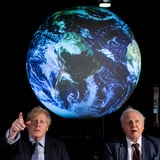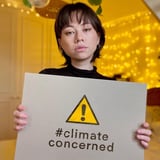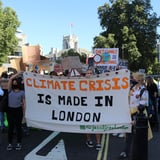
Image Source: Getty / Jeff J Mitchell
The 26th UN Climate Change Conference of the Parties (COP26) is “the world’s best last chance to get runaway climate change under control,” as described by the UN, its partners, and climate-justice activists. Hosted in Glasgow, Scotland, and in partnership with Italy, the annual COP26 summit takes place between 31 Oct. and 12 Nov. and invites world leaders from every nation to reach agreements on how to tackle climate change. Between Boris Johnson falling asleep at meetings and not wearing a face mask, Greta Thunberg and Fridays For Future going viral for singing “You can shove your climate crisis up your arse!”, and phrases like “net zero” and “1.5ºC” – what does it all mean? Keep reading for a simple explainer on the agreements at COP26 so far.
Remember the 2020 bushfires in Australia that kicked off the unlikely pandemic bingo card? Maybe the 2021 wildfires that turned California into a living hell-scape? Or the extreme 2021 flash floods in London that resulted in the turnstiles at Pudding Mill Lane station being almost completely underwater? That’s with only a slight global temperature rise of 1.1ºC. At COP21 in 2015, all nations agreed to the landmark Paris Agreement and promised to keep global warming temperatures well below 1.5ºC by 2030. Currently, we are very much not going to hit that target, and it’s crucial that we all start to take climate change very seriously. We can all be a part of climate justice, but it’s up to our governments and major corporations to actually make some tough decisions in the name of a liveable future on this planet. If at 1.1ºC we are experiencing heatwaves, floods, and air pollution, you can probably imagine how bad it could get at 1.5ºC. COP26 is a crucial summit where world leaders are making promises on how we can limit global warming to 1.5ºC by 2050 – since we won’t meet the 1.5ºC goal by 2030.
Image Source: Getty / Chris J Ratcliffe
For context, the world naturally gets warmer and cooler since it started spinning around the sun. The problem is that since around the 1960s, global warming temperature started rising at rapid speeds because of human activity. The main causes of global warming – besides inaction by governments and greedy corporations – are emissions from fossil fuels like coal, oil, and natural gas. Coal is used for generating electricity, gas is used for heating homes and water, and oil is used for cars, electricity, and heating. Drilling for oil and gas also includes byproducts like polyester fabrics (from petroleum) that are used by the majority of clothing companies. This explains why switching to electric cars is high up on the agenda for COP26, why Insulate Britain protesters were risking their lives to get the UK government to switch British homes to low-carbon heating and why sustainable fashion is a crucial conversation we all need to be a part of. The four COP26 goals include:
- Slowing down global warming by meeting our 1.5ºC target by 2030, which is being pushed to 2050 because we haven’t been doing the necessary work. This includes switching to electric cars, investing in renewable energy, cutting down fewer trees, and ending our reliance on coal power (where most of us get electricity).
- Protecting vulnerable communities and natural habitats by building defences, warning systems, and resilient infrastructure. This includes doubling the UK’s current investment of £11.6bn into international climate finance.
- Additionally, developed countries must invest $100bn per year into climate finance that is required to achieve our net zero emissions goal (1.5ºC by 2050).
- Working together to achieve these climate goals as detailed in the Paris Agreement.
Image Source: Getty / Peter Summers
The COP26 goals are great, but climate-justice activists are not impressed. More needs to be done to facilitate an inclusive and representative plan to achieve our net-zero goal. The big oil companies like Shell and our reliance on gas to heat British homes are not being adequately addressed. Currently, the UK government is paying big oil to pollute by offering billion of pounds in tax breaks. Also, postcolonial production systems are selectively being left out of the conversation when it comes to “working together”. This refers to the types of people and places on Earth that are being exploited so that shoppers in the global north can get a cheap dress from Shein on next-day delivery. While COP26 continues, and promises are made by world leaders and challenged by activists, keep checking here for the latest on the climate-justice conversation.


